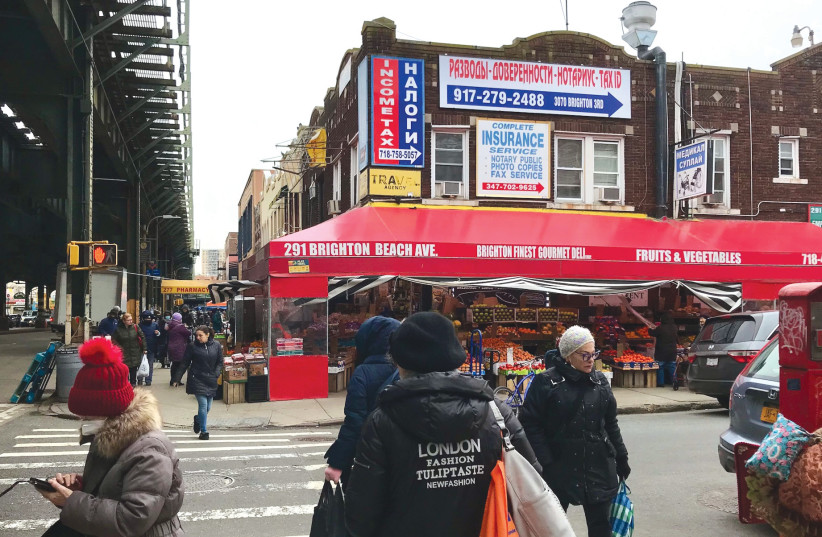NEW YORK – Inna Vernikov is an enigma in New York City’s sea of blue. A staunch supporter of Israel, the 37-year-old New York City Council member ran on promises to restore funding to the New York Police Department, and back merit-based education and school choice.
The pro-Trump Republican, who opposes COVID-19 vaccine mandates, has continued to make unique headlines less than three months after assuming office, as the sole Ukrainian-native on City Council, while tensions continue to mount in her homeland, as much of Europe’s second-largest country reels under a barrage of Russian rockets.
Vernikov, an immigration and divorce attorney, describes herself as a Ukrainian-born American Jew and was raised in Chernovitz under Soviet rule and came to New York in 1996, when she was 12 years old. She said that she became interested in politics while watching the scandal develop in the wake of the attack on the United States embassy in Benghazi.
Her decision to run for public office years later, stemmed from getting attacked on the Brooklyn Bridge during a Black Lives Matter protest while in her car and witnessing police officers being attacked, as well.
“On City Council, we are sending a strong message that New York City supports Ukraine,” she told The Jerusalem Post. “Together with the Jewish caucus, I have put in a resolution supporting Ukraine that I think will get a lot of support from City Council. I think it’s very important for civilians here to donate money for supplies and evacuations, that’s really all that we can do as regular civilians.”

The US government’s response, Vernikov continued, has not been adequate. “They need to be keeping the pressure on, strong sanctions and to freeze oligarch assets of those associated with [Russian President Vladimir] Putin. [US President Joe Biden] should have implemented sanctions a long time ago. We have weak leadership. If we had stronger leadership, we could have avoided this situation completely. The Biden administration is an embarrassment on the world stage right now. Putin sees us as weak; he was emboldened to act when he saw our pullout of Afghanistan over the summer. We have a sleeping president, literally.”
In regard to Israel’s government, which has voiced support of Ukraine but not criticism of Russia, Vernkiov said she is more understanding, “Israel is in a tough spot as one of the only countries that has good relations with both Ukraine and Russia. Knowing that Putin is a tyrant and dictator, I would say a terrorist at this time, there are a lot of Jews who were living very comfortably in Russia, not experiencing antisemitism.”
“It leaves Israel in a politically complicated place and Israel needs to tread lightly when it comes to making bold statements. At the same time, I applaud Israel for always being at the frontlines of humanitarian aid, that’s what Israel does best,” she said.
New York City is home to more than 150,000 Ukrainians, the largest concentration in the US. The majority of Ukrainians reside in Manhattan’s East Village, an area known as the Ukrainian Village or Little Ukraine.
Vernikov represents southern Brooklyn neighborhoods, home to the largest numbers of Jewish Ukrainian immigrants, including Gravesend, Sheepshead Bay, Manhattan Beach, and Brighton Beach, known to many as Little Odessa due to the large, yet tight-knit Ukrainian population. She noted that while many local Ukrainian families are fearful for their relatives, there seem to be mixed reactions across the board. Her own family is staying put in Chernovitz for now.
“In my district, the predominant culture is Jewish, not so much Ukrainian,” she said. “It’s important to remember that we have a complicated history with Ukraine. A lot of people have family who were killed in the Babyn Yar massacre. Most of the people in my district immigrated to the United States 30 plus years ago and their home is the United States of America, they don’t see Ukraine really as their homeland. It’s somewhere we escaped. It’s not to say that they don’t sympathize and empathize with Ukraine and the Ukrainian people. Most of my community stands with Ukraine and against Putin, but it’s complicated.”
The councilwoman recalled food rationing growing up under Soviet rule as a child and said Ukrainians don’t want to go back to that. She noted that the Jewish community in Ukraine has had a swift response to Russia’s invasion. Vernikov mentioned a former classmate, who is the director of Jewish life in Chernovitz, a city which so far has not faced the Russian advance. “He’s been very busy with resettling refugees from other cities,” Vernikov said.
“I also just finished speaking with one of the chief rabbis of Ukraine [Rabbi Yaakov Bleich],” she continued. “He is right now spearheading an operation to transport families, Jewish and non-Jewish, from Kyiv to other cities within Ukraine that aren’t being bombed, giving them shelter and medical supplies.”
She also spoke of a former neighbor’s husband who voluntarily joined the Ukrainian army. “A lot of American Ukrainians would like to return to their homeland to fight, but it’s not possible as of right now,” she said.
Vernikov, one of five Republicans in the 51-member council, expressed that her ambitions remain closer to City Council. “I want to make sure that my city and district are clean and safe for all of the people I represent, those are my political aspirations.”
